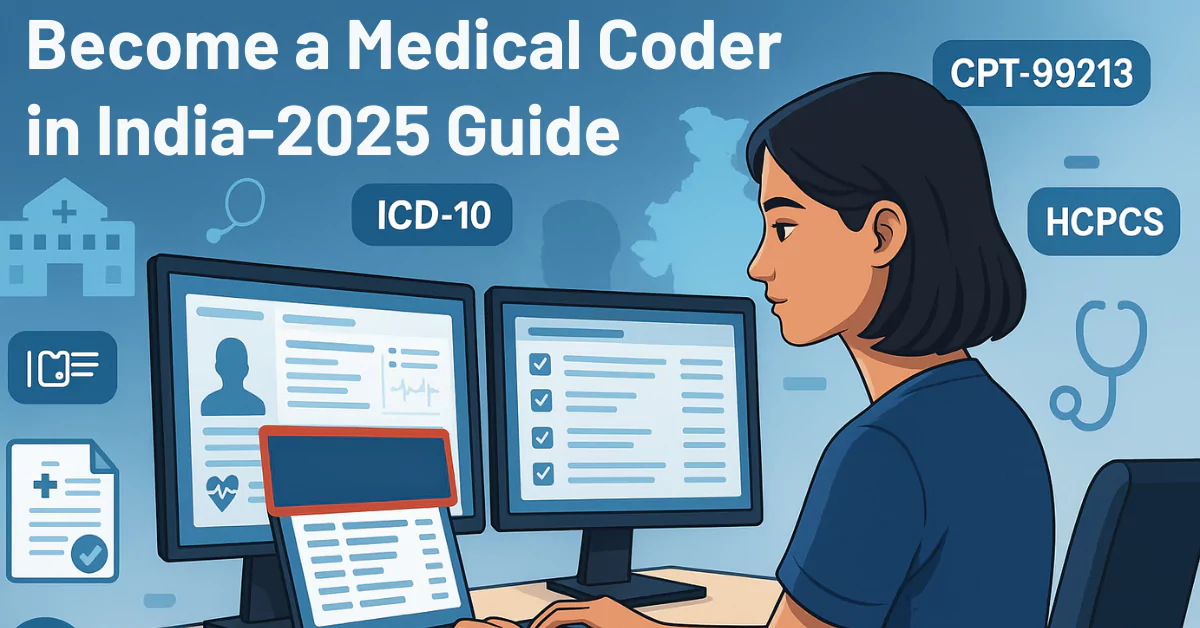Medical coding is a critical function in the healthcare industry. It serves as a bridge between doctor/hospital/clinic, patients, and insurance companies. A medical coder is responsible for converting a patient’s medical diagnosis, procedures, services, and equipment used into standardized codes.
With globalisation and integration of technology in healthcare system, demand for Medical Coder is expected to shoot up. Indian healthcare sector is projected to reach $638 billion by 2032 and insurance penetration is very low in India. This means that India is going to witness astronomical rise in Medical Coder, not just for domestic demand but also to fill in the global gap.
This article offers a step-by-step guide to becoming a medical coder in India, including salary prospects, job opportunities, course details, and qualifications.
What is Medical Coding?
Medical coding involves analyzing patient records and translating diagnosis and treatment information into universal alphanumeric codes. These codes are used for billing, insurance claims, data analysis, and maintaining standardized patient records.
Common Coding Systems:
| Code Type | Full Form | Purpose |
|---|---|---|
| ICD | International Classification of Diseases | Classifies diseases & symptoms |
| CPT | Current Procedural Terminology | Describes medical, surgical & diagnostic services |
| HCPCS | Healthcare Common Procedure Coding System | Used for Medicare/Medicaid billing (e.g., equipment) |
| DRG | Diagnosis-Related Groups | Classifies hospitalization costs for insurance reimbursement |
Responsibilities of a Medical Coder
- Review clinical documentation (doctor’s notes, lab results, discharge summaries)
- Assign accurate ICD, CPT, and HCPCS codes
- Ensure compliance with regulatory coding standards
- Prevent claim denials due to incorrect coding
- Maintain accurate electronic health records (EHR)
How to Become a Medical Coder in India: Step-by-Step Guide
Basic Educational Qualification
- Minimum: 10+2 from a recognized board
- Preferred: Bachelor’s degree (in life sciences, healthcare, or any stream)
Enroll in a Medical Coding Course
- Offered by: Colleges, vocational institutions, online platforms
- Curriculum includes:
- Medical terminology
- Anatomy & Physiology
- Healthcare laws & compliance
- Coding guidelines: ICD-10, CPT, HCPCS
Get Certified
Recommended Certifications:
- Certified Professional Coder (CPC) – AAPC
- Certified Coding Associate (CCA) – AHIMA
- Certified Coding Specialist (CCS) – AHIMA
Gain Practical Experience
- Internships in hospitals, clinics, insurance firms
- Entry-level coding roles or remote freelance projects
Stay Updated with Continued Education
- Attend workshops, online refreshers, and certification renewals
- Track updates in medical coding systems and regulations
Medical Coding Courses in India
Course Duration
| Program Type | Duration |
| Certificate/Diploma | 6 months – 1 year |
| Associate/Bachelor’s Degree | 2 – 3 years |
| Online Self-Paced | Up to 1 year |
Eligibility
- 10+2 (Science preferred, not mandatory)
- Graduation recommended for higher job roles
Course Fees
| Institution Type | Fee Range (INR) |
| Private Institutes | 20,000 – 2,00,000 per year |
| Government Colleges | 10,000 – 50,000 per year |
| Online Platforms | 5,000 – 80,000 per course |
Top Recruiters
- Private and Government Hospitals
- Medical Billing Companies
- Insurance Providers (e.g., Star Health, HDFC Ergo)
- Healthcare BPOs
- Pharmaceutical Companies
- Nursing Homes and Elder Care Facilities
Medical Coder Salary in India
| Experience Level | Average Annual Salary (INR) |
| Entry-Level (0–2 yrs) | 2-3 LPA |
| Mid-Level (2–5 yrs) | 3-6 LPA |
| Senior-Level (5+ yrs) | 5-10+ LPA |
Note: Certification, location, and work setting (in-house vs remote) influence salary.
Career Opportunities in Medical Coding
| Sector | Role Description |
| Hospitals & Clinics | Handle medical records, code patient treatments, ensure claim accuracy |
| Insurance Companies | Review claim codes for reimbursement accuracy |
| Government Health Agencies | Work with CMS or Ayushman Bharat for coding and analytics |
| Healthcare BPOs | Code and process medical billing for international clients |
| Elder Care/Nursing Homes | Code specialized geriatric and palliative care services |
| Freelancing/Remote | Work-from-home roles for Indian or overseas clients |
Skills Required for Medical Coders
- Deep understanding of medical terminology
- Attention to detail and accuracy
- Analytical & logical reasoning
- Familiarity with EHR software (e.g., Epic, Cerner)
- Regulatory knowledge (HIPAA, NABH standards)
Advantages of Becoming a Medical Coder
- High demand in India and globally
- Remote work flexibility
- Opportunities in both public and private sectors
- Pathway to roles like Auditor, Coding Supervisor, and HIM Manager
- Strong potential for career and salary growth
Challenges in the Field
- Regular updates in coding standards
- Risk of claim denial due to coding errors
- Need for ongoing certification and training
- High accuracy expectations
Future Scope of Medical Coding in India
With the Indian healthcare sector projected to reach $638 billion by 2032 (CAGR of 22%), medical coding professionals will be critical for:
- Managing increasing patient data
- Streamlining health insurance operations
- Powering telemedicine and digital health platforms
- Supporting medical tourism with accurate documentation
Medical coding is a stable, rewarding career option in India with excellent growth potential, especially in an increasingly digitized healthcare landscape. Whether you’re a fresh graduate, a career switcher, or a working healthcare professional, entering the world of medical coding offers flexibility, purpose, and a strong salary trajectory.

